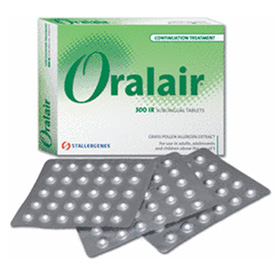Immunotherapy
 Allergen immunotherapy is the only treatment that can treat the cause of respiratory allergic diseases, such as allergic rhinitis , commonly known as hay fever, and allergic asthma. It may be suitable for moderate to severe respiratory allergy sufferers who have not been able to adequately control their condition with symptomatic treatments.
Allergen immunotherapy is the only treatment that can treat the cause of respiratory allergic diseases, such as allergic rhinitis , commonly known as hay fever, and allergic asthma. It may be suitable for moderate to severe respiratory allergy sufferers who have not been able to adequately control their condition with symptomatic treatments.
Allergen immunotherapy can:
- reduce or stop your allergic symptoms, even after you stop the treatment;
- reduce or stop the use of symptomatic drugs even during the first year of treatment;
- prevent the onset of new allergies, also known as polysensitisation;
- stop the development of allergic rhinitis into allergic asthma, and
- significantly improve your quality of life.
 Allergen immunotherapy is a 3 to 5 year treatment and helps re-educate the body’s immune system.
Allergen immunotherapy is a 3 to 5 year treatment and helps re-educate the body’s immune system.
The changes occur at the cellular level. Instead of the body over reacting and making antibodies that cause allergic symptoms, they make antibodies that don’t result in allergic symptoms. If followed correctly, allergen immunotherapy can work for two to three years or more after the last treatment.
Allergen immunotherapy works by gradually increasing doses of the responsible allergen. The symptoms and triggers of allergic rhinitis vary from one person to the next, so allergen immunotherapy is usually an individualised treatment.
Allergen immunotherapy re-educates the immune system and so is a long-term commitment for patients. It is recommended that allergen immunotherapy is continued for about three years, to decrease the chance that allergies will return. Allergen immunotherapy has been shown to increasingly reduce allergic rhinitis symptoms each year during the three years of treatment. It is very important that allergen immunotherapy continues for the entire treatment period to get the maximum benefit.
Who is suitable for allergen immunotherapy?
Adults and children over five years of age can be treated with allergen immunotherapy. It can be given by injection, known as subcutaneous or by drops or tablets under the tongue, known as sublingual.
Allergen immunotherapy has proven to be clinically effective in treating allergic rhinitis and allergic asthma. It may also prevent people from becoming allergic to more allergens or developing more allergic reactions, such as allergic asthma.
Your allergy specialist will advise you on the best course of treatment.
Types of allergen immunotherapy
Sublingual (under the tongue)
Sublingual allergen immunotherapy treatment can be taken under the tongue either as drops or tablets depending on the allergen. The doses prescribed by your doctor are adapted to your own allergic sensitiveness. This treatment is to be taken at home; it is essential that parents help children to take their treatment.
Drops
- The allergen drops are generally taken daily before breakfast and before brushing your teeth. The drops are placed under the tongue .Some drops are administered using a special pump. They should be kept under the tongue for two minutes before swallowing.
Tablet
- The tablets are taken daily before breakfast. The tablet is placed under the tongue until completely dissolved.
- For some, the tablets are started about four months before the expected onset of the pollen season and the treatment is maintained throughout the pollen season, and should then be repeated for three to five consecutive pollen seasons in order to get the full benefit. For others, the tablets are taken all year and should be continued for three to five years for full benefit.
Sublingual immunotherapy, depending on the treatment and the allergen you are allergic to can be taken all year round, this is called a perennial protocol or it can be started 4 months before the onset of the pollen season and maintained throughout the pollen season.
Subcutaneous (under the skin)
Subcutaneous treatment is only administered by your doctor. The treatment starts with a weekly injection of increasing doses of allergenic extract. This initiation phase last for about 13 weeks and is followed by one monthly injection. The injections should be continued monthly for three to five years in order to get the full benefit.
You should ask for a referral to an allergy specialist to discuss the suitability of allergen immunotherapy as a possible treatment.
